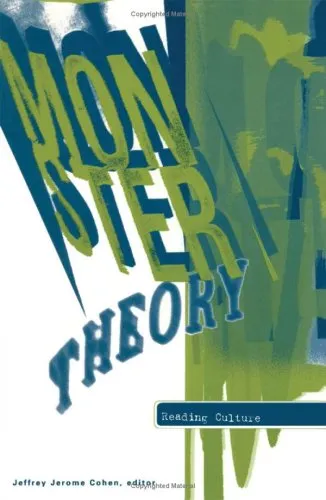Monster Theory: Reading Culture
4.5
Reviews from our users

You Can Ask your questions from this book's AI after Login
Each download or ask from book AI costs 2 points. To earn more free points, please visit the Points Guide Page and complete some valuable actions.Introduction to Monster Theory: Reading Culture
"Monster Theory: Reading Culture" by Jeffrey Jerome Cohen is a profound exploration of the symbolic and cultural significance of monsters in human society. With a unique lens on the fearsome and the grotesque, Cohen investigates how monsters serve as mirrors, reflecting our deepest fears, desires, and anxieties. This book is not just an exploration of fantastical creatures but a profound discourse on human culture and societal constructs.
Detailed Summary of the Book
At its core, "Monster Theory: Reading Culture" delves into the idea that monsters are born not just from random imaginations but are manifestations of cultural moments, anxieties, and identities. Cohen's theoretical framework suggests that monsters are indicative of the boundary between the known and the unknown, representing the margins of societal norms. Through a series of essays, Cohen and other contributors draw from literature, film, history, and folklore to present the monster as an emblem of what is deemed as "Other," thus provoking a critical analysis of societal behavior and deeply ingrained fears.
The book is organized around the central premise that monsters are a projection of collective human consciousness. Cohen introduces several theses that serve to probe how monsters engage with and reveal cultural tensions and boundaries. Each chapter offers a unique perspective, covering a range of topics such as modernity's monsters, gendered embodiments, and the monstrous in colonial contexts. The interdisciplinary approach of the book makes it an essential read for students and scholars of literature, cultural studies, anthropology, and history.
Key Takeaways
- The monster acts as a symbol of cultural anxieties and societal crises.
- Monsters are often positioned at the borders of human understanding, challenging norms and revealing hidden truths.
- The depiction and creation of monsters are deeply rooted in historical, cultural, and social contexts, reflecting the complexities of the human psyche.
- Monsters enable a discussion about "Otherness" and difference, exploring themes of race, gender, and identity.
- Cohen's theses provide a framework to analyze monsters in a way that reveals the dynamics of power, culture, and fear.
Famous Quotes from the Book
"The monster's body quite literally incorporates fear, desire, anxiety, and fantasy, giving them life and an uncanny independence."
"The monster polices the borders of the possible, and it calls others to see through the veils we drape over existence."
Why This Book Matters
"Monster Theory: Reading Culture" is essential because it opens up a dialogue about how we define and understand the "Other" in society. In a world increasingly confronted with cultural and social boundaries, this book offers crucial insights into how these boundaries are constructed and resisted. The monster, as Cohen argues, is not merely a figure of fear but a complex symbol that can teach us about acceptance, empathy, and the transformative power of cultural reflection.
The interdisciplinary nature of the book ensures its relevance across various fields of study, promoting a comprehensive understanding of cultural narratives and representations. By dissecting the layers of meaning behind the monstrous, Cohen invites readers to critically examine their own cultural assumptions and biases. This exploration is particularly pertinent in today's world where the monstrous is not only a facet of fiction but increasingly a part of political and social rhetoric.
Free Direct Download
You Can Download this book after Login
Accessing books through legal platforms and public libraries not only supports the rights of authors and publishers but also contributes to the sustainability of reading culture. Before downloading, please take a moment to consider these options.
Find this book on other platforms:
WorldCat helps you find books in libraries worldwide.
See ratings, reviews, and discussions on Goodreads.
Find and buy rare or used books on AbeBooks.
1416
بازدید4.5
امتیاز50
نظر98%
رضایتReviews:
4.5
Based on 0 users review
"کیفیت چاپ عالی بود، خیلی راضیام"


